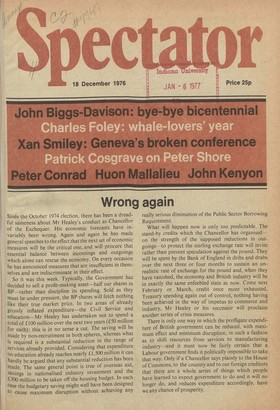Wrong again
Sine the October 1974 election, there has been a dreadful sameness about Mr Healey's conduct as Chancellor of the Exchequer. His economic forecasts have invariably been wrong. Again and again he has made general speeches to the effect that the next set of economic measures will be the critical one, and will procure that essential balance between incomings and outgoings which alone can rescue the economy. On every occasion he has announced measures that are insufficient in themselves and are indiscriminate in their effect.
So it was this week. Typically, the Government has decided to sell a profit-making asset—half our shares in BP—rather than discipline its spending. Sold as they must be under pressure, the BP shares will fetch nothing like their true market price. In two areas of already grossly inflated expenditure—the Civil Service and education—Mr Healey has undertaken not to spend a total of £100 million over the next two years (£50 million for each): this is in no sense a cut. The saving will be made by non-recruitment in both spheres, whereas what is required is a substantial reduction in the range of services already provided. Considering that expenditure on education already reaches nearly £1,500 million it can hardly be argued that any substantial reduction has been made. The same general point is true of overseas aid, savings in nationalised industry investment and the 000 million to be taken off the housing budget. In each case the budgetary saving might well have been designed to cause maximum disruption without achieving any
really serious diminution of the Public Sector Borrowing Req uirement.
What will happen now is only too predictable. The stand-by credits *hich the Chancellor has organised— on the strength of the supposed reductions in out goings—to protect the sterling exchange rate will invite rather than prevent speculation against the pound. They will be spent by the Bank of England in dribs and drabs over the next three or four months to sustain an un realistic rate of exchange for the pound and, when they have vanished, the economy and British industry will be in exactly the same enfeebled state as now. Come next February or March, credit once more exhausted, Treasury spending again out of control, nothing having been achieved in the way of impetus to commerce and industry, Mr Healey or his successor will proclaim another series of crisis measures.
There is only one way in which the profligate expenditure of British government can be reduced, with maxi mum effect and minimum disruption, in such a fashion as to shift resources from services to manufacturing industry—and it must now be fairly certain that a Labour government finds it politically impossible to take that way. Only if a Chancellor says plainly to the House of Commons, to the country and to our foreign creditors that there are a whole series of things which people have learned to expect government to do and it will no longer do, and reduces expenditure accordingly, have we any chance of prosperity.














































